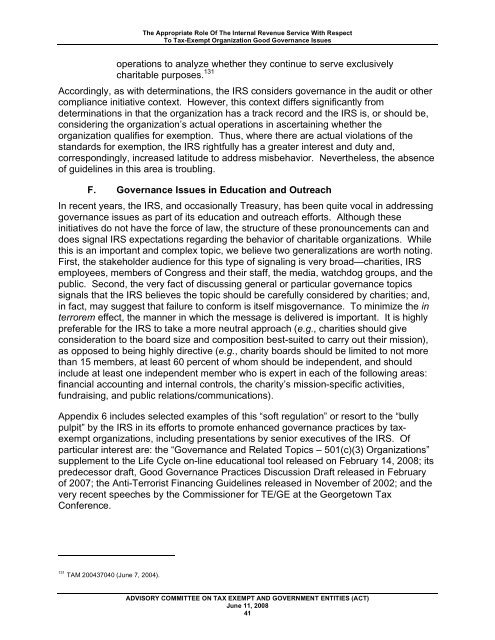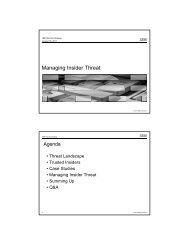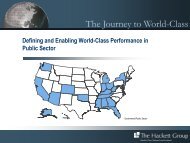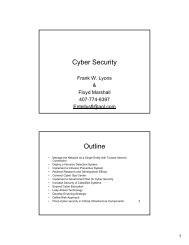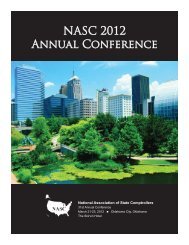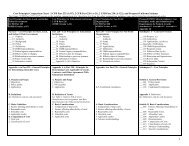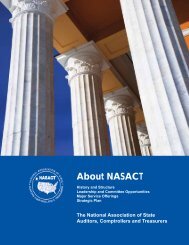Advisory Committee on Tax Exempt and Government Entities (ACT ...
Advisory Committee on Tax Exempt and Government Entities (ACT ...
Advisory Committee on Tax Exempt and Government Entities (ACT ...
Create successful ePaper yourself
Turn your PDF publications into a flip-book with our unique Google optimized e-Paper software.
The Appropriate Role Of The Internal Revenue Service With Respect To <strong>Tax</strong>-<strong>Exempt</strong> Organizati<strong>on</strong> Good Governance Issuesoperati<strong>on</strong>s to analyze whether they c<strong>on</strong>tinue to serve exclusivelycharitable purposes. 131Accordingly, as with determinati<strong>on</strong>s, the IRS c<strong>on</strong>siders governance in the audit or othercompliance initiative c<strong>on</strong>text. However, this c<strong>on</strong>text differs significantly fromdeterminati<strong>on</strong>s in that the organizati<strong>on</strong> has a track record <strong>and</strong> the IRS is, or should be,c<strong>on</strong>sidering the organizati<strong>on</strong>’s actual operati<strong>on</strong>s in ascertaining whether theorganizati<strong>on</strong> qualifies for exempti<strong>on</strong>. Thus, where there are actual violati<strong>on</strong>s of thest<strong>and</strong>ards for exempti<strong>on</strong>, the IRS rightfully has a greater interest <strong>and</strong> duty <strong>and</strong>,corresp<strong>on</strong>dingly, increased latitude to address misbehavior. Nevertheless, the absenceof guidelines in this area is troubling.F. Governance Issues in Educati<strong>on</strong> <strong>and</strong> OutreachIn recent years, the IRS, <strong>and</strong> occasi<strong>on</strong>ally Treasury, has been quite vocal in addressinggovernance issues as part of its educati<strong>on</strong> <strong>and</strong> outreach efforts. Although theseinitiatives do not have the force of law, the structure of these pr<strong>on</strong>ouncements can <strong>and</strong>does signal IRS expectati<strong>on</strong>s regarding the behavior of charitable organizati<strong>on</strong>s. Whilethis is an important <strong>and</strong> complex topic, we believe two generalizati<strong>on</strong>s are worth noting.First, the stakeholder audience for this type of signaling is very broad—charities, IRSemployees, members of C<strong>on</strong>gress <strong>and</strong> their staff, the media, watchdog groups, <strong>and</strong> thepublic. Sec<strong>on</strong>d, the very fact of discussing general or particular governance topicssignals that the IRS believes the topic should be carefully c<strong>on</strong>sidered by charities; <strong>and</strong>,in fact, may suggest that failure to c<strong>on</strong>form is itself misgovernance. To minimize the interrorem effect, the manner in which the message is delivered is important. It is highlypreferable for the IRS to take a more neutral approach (e.g., charities should givec<strong>on</strong>siderati<strong>on</strong> to the board size <strong>and</strong> compositi<strong>on</strong> best-suited to carry out their missi<strong>on</strong>),as opposed to being highly directive (e.g., charity boards should be limited to not morethan 15 members, at least 60 percent of whom should be independent, <strong>and</strong> shouldinclude at least <strong>on</strong>e independent member who is expert in each of the following areas:financial accounting <strong>and</strong> internal c<strong>on</strong>trols, the charity’s missi<strong>on</strong>-specific activities,fundraising, <strong>and</strong> public relati<strong>on</strong>s/communicati<strong>on</strong>s).Appendix 6 includes selected examples of this “soft regulati<strong>on</strong>” or resort to the “bullypulpit” by the IRS in its efforts to promote enhanced governance practices by taxexemptorganizati<strong>on</strong>s, including presentati<strong>on</strong>s by senior executives of the IRS. Ofparticular interest are: the “Governance <strong>and</strong> Related Topics – 501(c)(3) Organizati<strong>on</strong>s”supplement to the Life Cycle <strong>on</strong>-line educati<strong>on</strong>al tool released <strong>on</strong> February 14, 2008; itspredecessor draft, Good Governance Practices Discussi<strong>on</strong> Draft released in Februaryof 2007; the Anti-Terrorist Financing Guidelines released in November of 2002; <strong>and</strong> thevery recent speeches by the Commissi<strong>on</strong>er for TE/GE at the Georgetown <strong>Tax</strong>C<strong>on</strong>ference.131TAM 200437040 (June 7, 2004).ADVISORY COMMITTEE ON TAX EXEMPT AND GOVERNMENT ENTITIES (<strong>ACT</strong>) June 11, 2008 41


